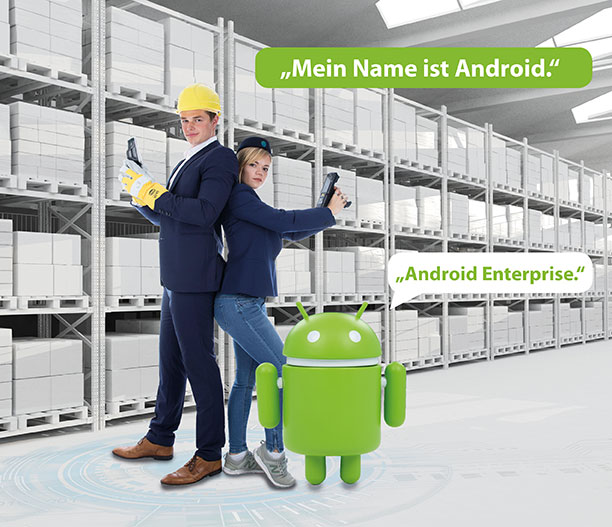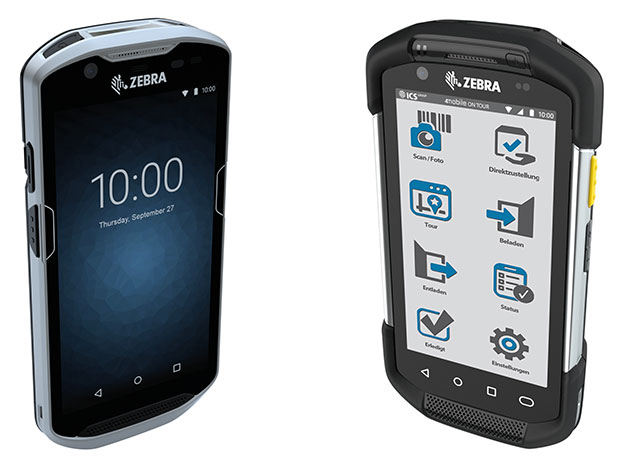Mobile Supply Chain in Transition
Android determines the future at platform level
Author: José da Silva, Chief Sales Officer, ICS Group
Neu-Anspach, January 2019: With Android™, an alternative operating system for mobile devices is conquering the enterprise auto-ID market. Against this background, companies are facing significant challenges in the areas of software and hardware on the one hand, but are also benefiting from considerable opportunities from the redesign of the mobile infrastructure on the other. In the following, you can find out which these are and what companies should take into account during the conversion.
In cooperation with the market leader Zebra Technologies (Zebra), the company ICS International GmbH Identcode-Systeme (ICS), a software and IT system house operating in the Auto-ID market for more than 30 years, provides valuable tips and background information on the subject of "Android". Companies facing the decision to say goodbye to the previous Windows world and switch to the future-oriented Android platform will be informed by ICS about possible steps for the optimal migration process and selection criteria for new hardware.
About 15 years ago, the first mobile Windows Enterprise operating systems from Microsoft with the name "Windows CE" and "Windows Mobile (Embedded)", based on Windows 3.1 and Windows 95, came onto the market and were already indispensable shortly after their introduction. With the optimization of functions and features, especially in the area of device management, they offered new possibilities to map business processes even more simply, efficiently and graphically oriented. In addition, the new operating systems, compared to the old platforms developed on DOS, offered the possibility of implementing additional tools and applications for different applications through the open architecture. These Windows operating systems therefore developed as solid, stable and reliable work platforms in the warehouse, production, transport and service sectors.
Today, more than 90 percent of companies with mobile applications have these operating systems in use company-wide. What sounds positive so far is no guarantee of consistency in the digital age. In the background, a large number of developers were already working on the popular "Google Android operating system" established in the smartphone market. In recent years, this system has undergone continuous further development and has been optimized through additional enterprise functionalities in terms of security, device management, WLAN network functions and finally barcode scanning functions in such a way that device manufacturers in the enterprise segment, such as Zebra, have also integrated these into their portfolio.
The Google Android Enterprise versions are now available on many Zebra devices. The triumph of this new operating system was further enhanced by Microsoft's announcement that support for the Microsoft Windows CE and Windows Mobile (Embedded Handheld 6.5) platforms would be discontinued in the foreseeable future, and according to current information, mainstream support with regular updates for both systems has already been discontinued. At the beginning of 2020, the security updates and patches that are important for companies will no longer be available.
With support for the Windows CE and Windows Mobile systems still running soon to be phased out, many companies must now decide how to proceed. The companies ICS and Zebra recommend to push this decision forward quickly. Possible scenarios, such as time-consuming new application developments and the associated new device selection, can become very time-consuming and thus increase the risk of securing IT processes.
A popular question that ICS is often asked in consulting sessions is whether the currently used Windows-based mobile devices can be updated with Android software. In most cases, the answer is a clear "no", since even the latest operating systems require a minimum of memory and, above all, processor power. However, this can only be finally answered by a professional analysis of the devices. The recommendation of the ICS and Zebra is to deal with the topic already today. Go through the possible scenarios with your IT partner.
What are the advantages of the new operating system?
The decisive technical achievements are based on the system itself. In addition, initial evaluations quickly reveal that the operating system in the enterprise environment only reaches its optimum through the additional features, which are accompanied by the device manufacturer. This means, among other things, that important basic work between the device manufacturer and the operating system provider has to be carried out.
ICS rates them as very productive between Zebra and Google, which is confirmed by the constant state-of-the-art performance of Zebra devices with Android systems. Zebra offers in its Android based device environment a lot of additional features, which ensure an optimal application of different processes for the coming years.
These features include Mobility Extensions (Mx), which improve device communication for business processes and significantly simplify device management. In addition, Zebra offers LifeGuard™ for Android, a software security solution that guarantees the lifecycle of Android-based Zebra enterprise class mobile computers over many years and guarantees regular security updates as well as security support.
It has never been easier to find or have software applications developed for every area. Android is supported by a huge worldwide community. Furthermore almost everyone knows Android and therefore it is easier for companies to train the applications and handling. This increases productivity and lowers costs during implementation. Furthermore, Android operating systems guarantee a high degree of data security and data encryption. Private and company data can be strictly separated from each other, which is becoming increasingly important as many companies are confronted with the issue of "Bring Your Own Device (BYOD)".
ICS and Zebra have made further very useful information on the diverse features for mobile Android applications in business available online at www.countdown4mobility.eu/features for interested parties.
A strategic concept for the migration or integration of mobile applications and mobile devices is recommended for the future application of Android. Here the following central questions have to be considered:
- Which software applications are currently still in use?
- Are these applications client-server or client-based?
- What are the security requirements for data processing?
- Which operating systems are in use?
- Which applications are in focus?
- What time windows exist?
- What is the underlying cost framework / budget?
Companies that cannot map the know-how and methodological competence for strategic IT concepts with their own resources should obtain professional consulting services in order to ensure integrative and sustainable solutions.
The right choice of equipment is crucial!
What is often sufficiently underestimated is the fact that the hardware and its features play an important role for sustainable Android concepts in the mobile infrastructure. In addition to device performance with regard to the intended software applications, work ergonomics and device operational safety are decisive success indicators for sustainable process optimization.
For example, empirical values as well as previous and future requirements regarding scanner performance and rechargeable battery have to be considered carefully before a planned device replacement. It is therefore advisable to carry out the device evaluation with an IT partner of your choice in order to cover all relevant software and hardware requirements in advance. The radio power (RF module) as well as the connectivity to radio servers in the network must be tested. Special enterprise solutions, such as those from Zebra, offer optimal display and security in conjunction with kiosk modules.
With over 60 percent market share in the Android Enterprise environment, ICS likes to use the Zebra product landscape for customer requirements. Various Zebra devices have also been specially tested and are recommended by Google under the term "Android Enterprise Recommended" for business applications.
According to this recommendation, only selected products have been included that have certain parameters for process security in their function. This includes technical aspects such as processor performance, but also ensuring software updates and security patches. Zebra guarantees Extended Support for up to 10 years after purchase. Detailed information on recommended Android devices in the enterprise environment can be found on the Zebra web site at https://www.android.com/enterprise/recommended.
Conclusion
The new Android operating systems offer many new functionalities and security options for companies. For example, they allow BYOD-enabled IT landscapes to be integrated. Optimized total cost of ownership (TCO) is also guaranteed by additional device features from the manufacturers. Ultimately, the customer decides when to switch over and which time window to make available.
Press Contact
René Weiler
Head of Marketing
Tel.: +49 6142 49794-70
E-Mail: rweiler@ics-group.eu







